Related Research Articles
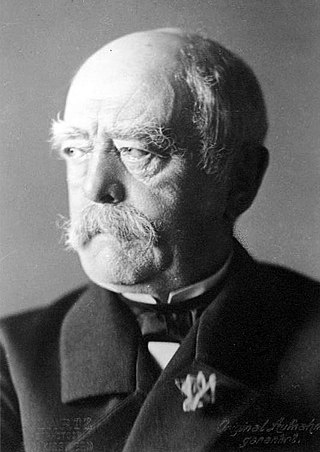
Otto, Prince of Bismarck, Count of Bismarck-Schönhausen, Duke of Lauenburg was a Prussian statesman and diplomat who oversaw the unification of Germany. Bismarck's Realpolitik and firm governance resulted in him being popularly known as the Iron Chancellor.

The German Confederation was an association of 39 predominantly German-speaking sovereign states in Central Europe. It was created by the Congress of Vienna in 1815 as a replacement of the former Holy Roman Empire, which had been dissolved in 1806 as a result of the Napoleonic Wars.
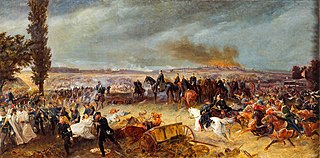
The Austro-Prussian War, also by many variant names such as Seven Weeks' War, German Civil War, Brothers War or Fraternal War, known in Germany as Deutscher Krieg, Deutsch-Deutscher Krieg, Deutscher Bruderkrieg and by a variety of other names, was fought in 1866 between the Austrian Empire and the Kingdom of Prussia, with each also being aided by various allies within the German Confederation. Prussia had also allied with the Kingdom of Italy, linking this conflict to the Third Independence War of Italian unification. The Austro-Prussian War was part of the wider rivalry between Austria and Prussia, and resulted in Prussian dominance over the German states.

William I, or Wilhelm I, was King of Prussia from 1861 and German Emperor from 1871 until his death in 1888. A member of the House of Hohenzollern, he was the first head of state of a united Germany. He was de facto head of state of Prussia from 1858, when he became regent for his brother Frederick William IV. During the reign of his grandson Wilhelm II, he was known as Wilhelm the Great.

The North German Confederation was initially a German military alliance established in August 1866 under the leadership of the Kingdom of Prussia, which was transformed in the subsequent year into a confederated state that existed from July 1867 to December 1870. A milestone of the German Unification, it was the earliest continual legal predecessor of the modern German nation-state known today as the Federal Republic of Germany.
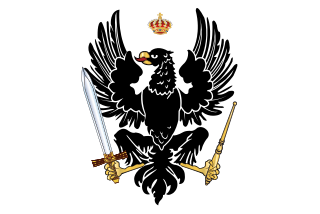
Prussia was a German state centred on the North European Plain that originated from the 1525 secularization of the Prussian part of the State of the Teutonic Order. The Knights had to relocate their headquarters to Mergentheim, but still kept their land in Livonia until 1561; they lost all their land by the Napoleonic Wars.

Albrecht Theodor Emil Graf von Roon was a Prussian soldier and statesman. As Minister of War from 1859 to 1873, Roon, along with Otto von Bismarck and Helmuth von Moltke, was a dominating figure in Prussia's government during the key decade of the 1860s, when a series of successful wars against Denmark, Austria, and France led to German unification under Prussia's leadership. A moderate conservative and supporter of executive monarchy, he was an avid modernizer who worked to improve the efficiency of the army.

The National Liberal Party was a liberal party of the North German Confederation and the German Empire which flourished between 1867 and 1918.

The Second Schleswig War, also sometimes known as the Dano-Prussian War or Prusso-Danish War, was the second military conflict over the Schleswig-Holstein Question of the nineteenth century. The war began on 1 February 1864, when Prussian and Austrian forces crossed the border into the Danish fief Schleswig. Denmark fought troops of the Kingdom of Prussia and the Austrian Empire representing the German Confederation.
The Free Conservative Party was a liberal-conservative political party in Prussia and the German Empire which emerged from the Prussian Conservative Party in the Prussian Landtag in 1866. In the federal elections to the Reichstag parliament from 1871, it ran as the German Reich Party. DRP was classified as centrist or centre-right by political standards at the time, and it also put forward the slogan "conservative progress".
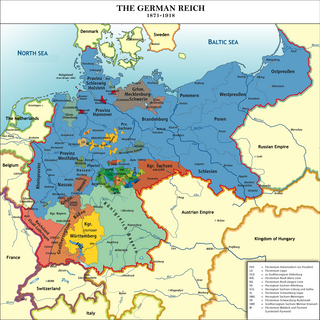
The unification of Germany was a process of building the first nation-state for Germans with federal features based on the concept of Lesser Germany. It commenced on 18 August 1866 with adoption of the North German Confederation Treaty establishing the North German Confederation, initially a military alliance de facto dominated by Prussia which was subsequently deepened through adoption of the North German Constitution.

Karl Wilhelm Rudolf von Bennigsen was a German politician descended from an old Hanoverian family.
The German Progress Party was the first modern political party in Germany, founded by liberal members of the Prussian House of Representatives in 1861 in opposition to Minister President Otto von Bismarck.
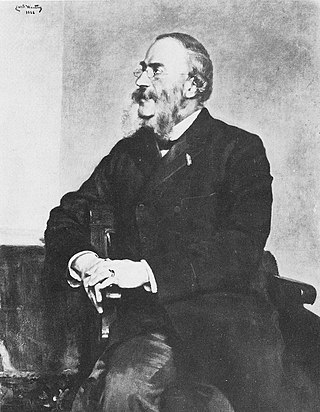
Gerson von Bleichröder was a Jewish German banker. He was also a close confidant of Otto von Bismarck, serving as his financial agent. He became the first non-converted Jew in Prussia to be granted a hereditary title of nobility.
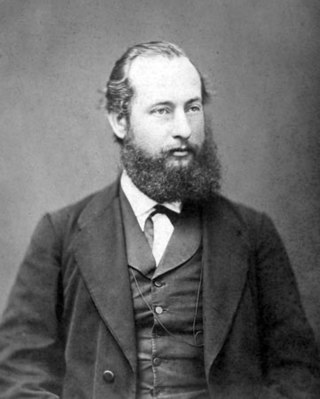
Wilhelm Hasenclever was a German politician. He was originally a tanner by trade but later became a journalist and author. However, he is most known for his political work in the predecessors of the Social Democratic Party of Germany (SPD).
The Saxon People's Party was a left-liberal and radical democratic party with socialist leanings in Germany, founded by Wilhelm Liebknecht and August Bebel on 19 August 1866 in Chemnitz, and integrated into the newly-founded Social Democratic Workers' Party (SDAP) on 8 August 1869. It was an alliance between liberal, anti-Prussian bourgeois and socialist workers' organizations in Saxony. It is considered one of the precursors to the Social Democratic Party of Germany.

Hans Victor von Unruh was a Prussian civil servant and politician, President of the Prussian National Assembly of 1848 and Member of the Reichstag of the German Empire.
The Liberal Union was a short-lived liberal party in the German Empire. It originated in 1880 as a breakaway from the National Liberal Party and so was also called the Secession. It merged with the left liberal German Progress Party to form the German Free-minded Party in 1884.

The Reichstag of the North German Confederation was the federal state's lower house of parliament. The popularly elected Reichstag was responsible for federal legislation together with the Bundesrat, the upper house whose members were appointed by the governments of the individual states to represent their interests. Executive power lay with the Bundesrat and the king of Prussia acting as Bundespräsidium, or head of state. The Reichstag debated and approved or rejected taxes and expenditures and could propose laws in its own right. To become effective, all laws required the approval of both the Bundesrat and the Reichstag. Voting rights in Reichstag elections were advanced for the time, granting universal, equal, and secret suffrage to men above the age of 25.
The North German Confederation Treaty was the treaty between the Kingdom of Prussia and other northern and central German states that initially created the North German Confederation, which was the forerunner to the German Empire. This treaty, and others that followed in September and October, are often described as the August treaties, although not all of them were concluded in August 1866.
References
- ↑ Joll, James (1964), "Prussia and the German Problem, 1830−1866", The New Cambridge Modern History: Volume 10, The Zenith of European Power, 1830−1870, Cambridge University Press, p. 507
- ↑ Phillips, Walter Alison (1911). . In Chisholm, Hugh (ed.). Encyclopædia Britannica . Vol. 11 (11th ed.). Cambridge University Press. pp. 828–901, see page 870, para 6.
Views as to Germany unity....The German National Union (Deutscher Nationalverein), organized in the autumn of 1859, favoured the exclusion of Austria and the establishment of a federation under the hegemony of Prussia; it represented the views of the so-called "Gothaer," the political heirs of the rump of the Frankfort parliament which had reassembled at Gotha in June 1849.....
- ↑ Anderlik, Heidemarie; Asmuss, Burkhard; Spenkuch, Hartwin (1990), ""Eisen und Blut" (Iron and Blood): The Way to a German Nation-State", Bismarck - Prussia, Germany, and Europe, Berlin: German Historical Museum, archived from the original on 18 May 2006
- ↑ Winkler, Heinrich August (2000), Germany: The Long Road West, 1789-1933, Oxford University Press, p. 135
- 1 2 "Eisenach Declaration of the National Association (1859)", German History in Documents and Images, German Historical Institute
- ↑ Rudolf von Bennigsen, Encyclopædia Britannica, 2012
- ↑ Biesinger, Joseph (2006), "Rudolf von Bennigsen", Germany: A Reference Guide from the Renaissance to the Present, Facts on File